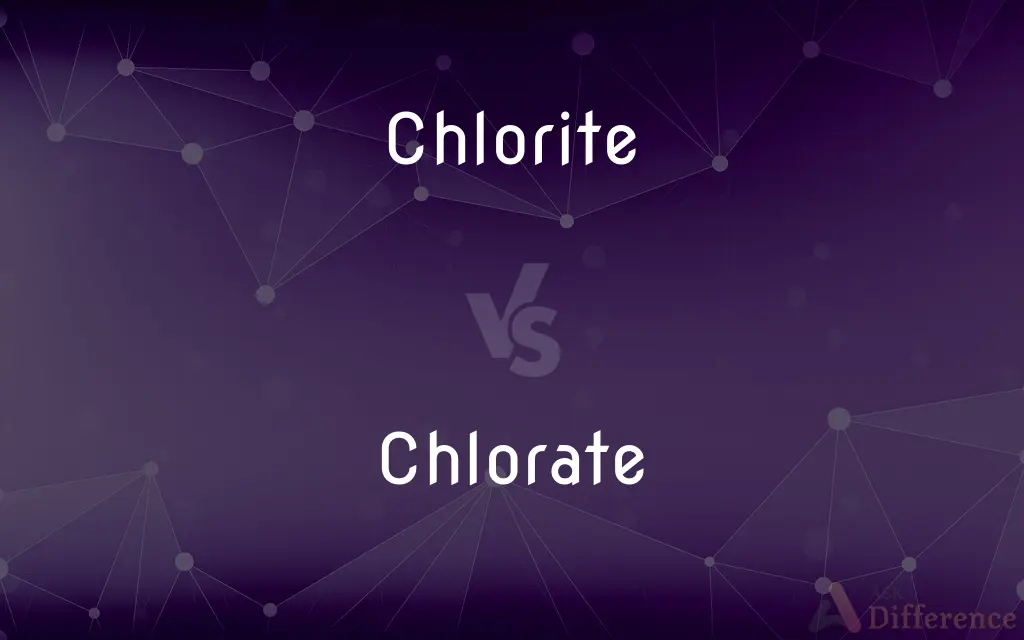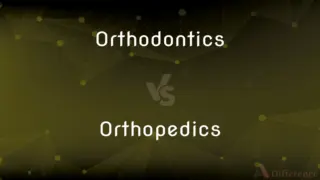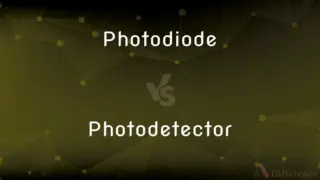Chlorite vs. Chlorate — What's the Difference?
By Maham Liaqat & Fiza Rafique — Updated on May 8, 2024
Chlorite is an anion with a chemical formula of ClO₂⁻, used primarily in bleaching and water treatment, while chlorate is an anion with a chemical formula of ClO₃⁻, used in herbicides and explosives.

Difference Between Chlorite and Chlorate
Table of Contents
ADVERTISEMENT
Key Differences
Chlorite contains chlorine in a +3 oxidation state and is commonly found in compounds used for disinfection and bleaching purposes, such as sodium chlorite. On the other hand, chlorate contains chlorine in a +5 oxidation state and is typically used in herbicides and explosives due to its strong oxidizing properties.
The chlorite ion, ClO₂⁻, is less stable than the chlorate ion, ClO₃⁻, and is often produced in situ for applications like water treatment. Chlorate compounds, however, are more stable and are widely available in the form of sodium chlorate, which is useful in manufacturing and agriculture.
Both ions are reactive, but chlorate is a more powerful oxidizer than chlorite. This property makes chlorate highly effective in applications like defoliants or fireworks, whereas chlorite is preferred for gentler applications like disinfection.
Chlorite and chlorate also differ in terms of safety concerns. Chlorate is more hazardous due to its higher oxidative potential, which can lead to accidental ignition or explosions, while chlorite is typically safer when handled properly.
Comparison Chart
Formula
ClO₂⁻
ClO₃⁻
ADVERTISEMENT
Oxidation State
+3
+5
Primary Uses
Bleaching, disinfection
Herbicides, explosives
Stability
Less stable
More stable
Oxidizing Strength
Moderate
Strong
Compare with Definitions
Chlorite
Anion ClO₂⁻.
The chlorite ion is present in some disinfectants.
Chlorate
Anion ClO₃⁻.
Sodium chlorate contains the chlorate ion.
Chlorite
Chlorine in a +3 state.
Chlorite compounds contain chlorine in an oxidation state of +3.
Chlorate
Chlorine in a +5 state.
In chlorate compounds, chlorine has a +5 oxidation state.
Chlorite
Less stable ion.
Chlorite ions tend to degrade more quickly than chlorate ions.
Chlorate
Used in herbicides.
Chlorate-based herbicides can clear weeds effectively.
Chlorite
Moderate oxidizing agent.
Chlorite is milder in oxidation strength compared to chlorate.
Chlorate
Powerful oxidizing agent.
The high oxidative power of chlorate makes it valuable in explosives.
Chlorite
Used for bleaching.
Sodium chlorite is effective for bleaching fabrics.
Chlorate
Stable compound.
Chlorate salts are generally stable and long-lasting.
Chlorite
The chlorite ion, or chlorine dioxide anion, is the halite with the chemical formula of ClO−2. A chlorite (compound) is a compound that contains this group, with chlorine in the oxidation state of +3.
Chlorate
The chlorate anion has the formula ClO−3. In this case, the chlorine atom is in the +5 oxidation state.
Chlorite
A generally green or black secondary mineral, (Mg,Fe,Al)6(Si,Al)4O10(OH)8, often formed by metamorphic alteration of primary dark rock minerals, that appears as a spot of green and resembles mica.
Chlorate
The anionic univalent group ClO3 derived from chloric acid, or a compound containing this group.
Chlorite
The anionic univalent ClO2 group derived from chlorous acid, or a compound containing this group.
Chlorate
(chemistry) Any salt of chloric acid.
Chlorates are powerful oxidizing agents.
Chlorite
(mineral) A dark green mineral resembling serpentine, being a mixed silicate of magnesium, iron and aluminium.
Chlorate
A salt of chloric acid; as, chlorate of potassium.
Chlorite
Any salt of chlorous acid.
Chlorate
Any salt of chloric acid
Chlorite
The name of a group of minerals, usually of a green color and micaceous to granular in structure. They are hydrous silicates of alumina, iron, and magnesia.
Chlorite
Any salt of chlorous acid; as, chlorite of sodium.
Chlorite
A generally green or black mineral; it occurs as a constituent of many rocks typically in the form of a flat crystal
Common Curiosities
Is chlorite less stable than chlorate?
Yes, chlorite is generally less stable than chlorate.
What is the main difference between chlorite and chlorate?
Chlorite (ClO₂⁻) has chlorine in a +3 state, while chlorate (ClO₃⁻) has chlorine in a +5 state.
Why is chlorate used in herbicides?
Chlorate's strong oxidizing properties make it effective in killing weeds.
Are both chlorite and chlorate safe to handle?
With proper precautions, yes, but chlorate is more hazardous due to its strong oxidizing potential.
Which ion is considered a stronger oxidizer?
The chlorate ion is a stronger oxidizer compared to the chlorite ion.
Is chlorate effective in fireworks production?
Yes, chlorate's high oxidizing strength makes it useful in pyrotechnics.
How does the oxidation state of chlorine differ in chlorite and chlorate?
Chlorine has an oxidation state of +3 in chlorite and +5 in chlorate.
Can chlorite and chlorate be mixed together?
Mixing these compounds should be done with caution due to their reactive nature.
What are the typical uses of chlorite compounds?
Chlorite is used in bleaching, water disinfection, and as a disinfectant.
Are chlorite and chlorate compounds stable?
Chlorate is generally more stable, while chlorite tends to degrade more easily.
Can chlorite be found naturally?
Chlorite is not typically found in nature; it's synthesized for industrial use.
What industries use chlorate compounds?
Chlorate is used in agriculture, pyrotechnics, and industrial chemistry.
Can chlorite be used in explosive applications like chlorate?
No, chlorite isn't commonly used in explosives due to its lower oxidative strength.
How are chlorite and chlorate ions detected in solutions?
Specific chemical tests or instrumentation, like ion chromatography, can detect these ions.
Are both chlorite and chlorate compounds soluble in water?
Yes, most chlorite and chlorate salts are water-soluble.
Share Your Discovery

Previous Comparison
Orthodontics vs. Orthopedics
Next Comparison
Photodiode vs. PhotodetectorAuthor Spotlight
Written by
Maham LiaqatCo-written by
Fiza RafiqueFiza Rafique is a skilled content writer at AskDifference.com, where she meticulously refines and enhances written pieces. Drawing from her vast editorial expertise, Fiza ensures clarity, accuracy, and precision in every article. Passionate about language, she continually seeks to elevate the quality of content for readers worldwide.
















































